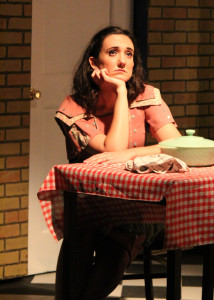Last Road to Pleasantville
OC’s Chance Theater Escapes to the 50’s in MAPLE AND VINE
by Joel Beers
 Jordan Harrison’s 2011 play, Maple and Vine, couldn’t come to OC at a better time for all you hepcats in love with everything about the 1950s except, oh, the unsettling reality simmering beneath its placid surface. The vintage sofas and appliances. The tumbler of Scotch in one hand, cigarette in the other. The snazzy period outfits.
Jordan Harrison’s 2011 play, Maple and Vine, couldn’t come to OC at a better time for all you hepcats in love with everything about the 1950s except, oh, the unsettling reality simmering beneath its placid surface. The vintage sofas and appliances. The tumbler of Scotch in one hand, cigarette in the other. The snazzy period outfits.
But there is nothing ironic or hipster or Mad Men theme party about the adoration of the decade in Harrison’s smart, provocative play.
The Society of Dynamic Obsolescence (SDO) is a movement charged with meticulously creating the year 1955 in a huge gated community in some unnamed, landlocked American state. The Internet doesn’t exist; there are no smartphones, poly-blends, Grey Goose or sushi. Instead, there are narrow roads and wide sidewalks, games of charades, Smirnoff vodka, and rotary phones; slow cooking is not a fad, but rather the only way to prepare a meal.
It’s clear the people who have chosen this lifestyle aren’t just taking a whimsical step into the past. They’re fleeing their overmedicated, hyper-technological lives of big-city alienation and isolation in the hope that an alternate world in which people actually talk to one another and time moves more slowly will reconnect them to both themselves and their community.
At least those are the people we meet. Katha (a multitextured Jennifer Ruckman) is a woman of influence who loathes life in New York City. She and her husband, Ryu (an apparently less-flustered Robert M. Lee), a plastic surgeon, make terrific money, but Katha, still reeling from a miscarriage six months earlier, is mired in depression. As she says, she is tired of cold repetition with no chance of peace, sick of being connected 24/7 with a variety of gadgets but lacking genuine human connection. In steps Dean (a slick, polished and believable Daniel Fagan), who is recruiting people for the SDO. He meets Katha by chance on a sidewalk, and soon she and Ryu have committed to a six-month sojourn in the community.
Their dossier (everyone can pick one, from a housewife or factory worker to a communist dissenter or Beat poet) is an Ozzie and Harriet-like nuclear family. Ryu goes to work in a factory every day, and Kathy (the name Katha doesn’t pass muster in 1955) stays at home, tries to get pregnant and spends seven hours making chicken stock. And, for the first time in months, if not years, they start understanding that happiness isn’t something by which they measure how not uncomfortable they are, but a genuine feeling.
Of course, all is not wine and roses. Authenticity is the key to the SDO, and while the city planners have rigorously replicated parks with fountains in the nice neighborhoods, there are parks with graffiti in the neighborhoods that aren’t as “nice,” but are “the kind where homosexuals and communists might meet at night.”
The first act is all setup, alternating between Katha and Ryu’s decision to leave and Dean and his wife, Ellen (a prim and proper Kelly Ehlert carrying a world of grief), explaining the SDO to an unseen group of new recruits. The second act isn’t as strong; the focus switches from Katha’s discovery to the unseemly (for 1955) truth about Dean and Roger (an effective James McHale), and the characters, while becoming more complicated, also become shallower. For instance, as part of one of the few mixed-race couples in the community, Katha, wholly committed to authenticity at any cost, pleads with her neighbors to project more prejudice on her and Ryu. Stare at her in the supermarket. Tell her Japanese-born husband how much they like Chinese food. Let kids bang trash cans outside their house at night.
But as the characters’ obsession with authenticity grows, they realize the world they’ve left lingers inside them, and no one wrestles with that more than Dean and Katha. Faced with fleeing or hanging on, both face choices that threaten the insular community they apparently love so much.
The play ends with the most in-the-head character, Katha, still questioning the reality of her newfound faux world. And, in another masterful stroke by Harrison, backed by director Mark Ramont’s gentle hand at the helm, there is no easy answer provided. Is this world of close-knit neighbors and pigs in a blanket any different, really, from the suffocating technological matrix that made her feel trapped and anxious?
Ultimately, it seems clear in Harrison’s mind that such a shift, whether in time or place, doesn’t change anything if the person doing it is more running away from something than running toward it. And it raises the issue of whether romanticizing the past is purely nostalgia and yearning for a simpler, less stressed-out life, or that when faced with a future that seems dried-up, the only place to turn is either toward a manufactured yesterday or into the cold embrace of an infinite arsenal of devices designed to continually distract us.
Leave a Reply

